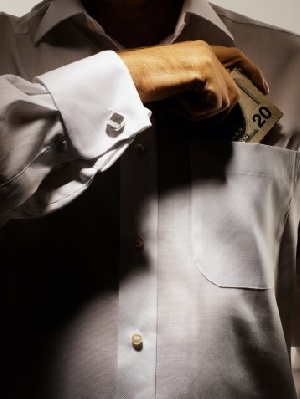Highly-placed security sources have revealed that there is widespread ticket racketeering at most of the state-owned stadia for premier league matches with the Kumasi Stadium as the worst venue.
This trend, which is rearing its head after years of trying to curb it, is costing the National Sports Council (NSC), owners of most of these stadiums, lose millions of cedis weekly as the racketeering business seems to be done with some level of connivance from club officials.
In the past, some unscrupulous people indulged in the impropriety of printing fake tickets, sold them on big match days and pocketed the money. At other times too they dip their hands in the sales for the day, thus leaving only a small amount, even though attendance may be very high.
This time round, despite the huge attendance and sometimes officially hiked prices, which means higher returns on gate proceeds, what are realised are under-declared. Due to its sensitive nature and the security apparatus setting an investigative team to work to unravel this new trend of cheating, Graphic Sports investigations have revealed that this development has been largely enhanced by the Ghana Football Association (GFA) Congress adoption of the winner-takes-all policy, which began last season.
Under this policy, the home team takes all the gate proceeds without any percentage for the visiting team. With this, the home team is encouraged to employ all the marketing strategies to attract a large attendance, especially when clubs with huge following are involved.
The paper’s investigation have further revealed that this system of cheating is causing the owners of the stadiums their right share of the proceeds, thus hindering their ability to generate enough funds to properly maintain the stadiums.
A ticket-racketeering syndicate was first busted in 1996 when some members of staff of the National Sports Council (NSC) and other collaborators were sacked after pocketing millions of cedis realized from an international charity sports show.
The show, dubbed the Max Brito Charity Show, which involved Accra Hears of Oak and an internationally assembled team, as well as a rugby match, was in aid of former Ivorian rugby player, Max Brito, who got injured during a rugby match and later got paralysed and Hearts’ ailing goalkeeper Ali Jaraah.
Though almost ?200 million was realised from the well-attended show, which had tickets being sold at special rates, only a paltry sum of ?97 million was declared, sparking a fierce criticism from Mr Herbert Mensah, then Country Manager of M-Net, organisers of the event.
Embarrassed by the dent that the theft had caused on the image of the nation, the Ministry of Youth and Sports (MOYS) and the NSC, the then Youth and Sports Minister, E.T. Mensah, set up a five-man committee to investigate the matter.
Former Vice-President Prof J.E.A. Mills, who was then the head of the Internal Revenue Service (IRS), chaired the investigation committee. As part of measures to curb the deals, the stakeholders involved introduced the security hologram tickets in addition to using people from outside and other security personnel to coordinate in the sales of tickets rather than staff from the NSC. Over the years, however, the clubs’ desire to takeover the organization of the matches seems to have created a leeway for the business to blossom again.
Soccer News of Friday, 7 June 2002
Source: gna

















